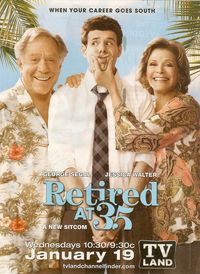If you haven't already had your fill of me blathering on about TV and ebooks, I will be a guest tonight on Ed Robertson's podcast TV Confidential, blathering some more. You can catch it at 7 pm on ShokusRadio.com and again on Tuesday at 9 pm. on InternetVoicesRadio.com, Friday at 5 & 8 pm on KSAV.org, Saturday at 9 pm on KWDJ-AM in Ridgecrest, and it will be broadcast directly into your brain while you are sleeping tonight. If they still fail to reach you, the program will be archived at TVConfidential.net.
Take a Hint
The print ads for the awful new TVLand sitcom RETIRED AT 35 feature the three stars of the show under the headline "When Your Career Goes South." I couldn't help noticing what's missing from the picture. See if you can spot it (click on the photo for a larger view):

The show's three stars are pictured, but only two are identified — George Segal and Jessica Walter. The poor guy who is at the center of the sitcom and the advertisement isn't mentioned at all. Apparently, his career has already gone south. If I was him, whoever the hell he is, I'd start looking for a new agent.
Fatal Beauty
My Uncle Burl Barer's latest true crime book, FATAL BEAUTY, explores yet another bizarre and compelling homicide with a cast of outrageous characters straight out of an Elmore Leonard novel:
Jimmy Joste was a powerhouse in the oil and gas industry, but he was a weakling when it came to his gorgeous, athletic, longtime lover, Rhonda Glover. Addicted to her sexual prowess and madly in love, Joste gave her homes, cars, cash, and a $350,000 engagement ring. Their fifteen years of passion and excess ended the day Rhonda drove directly from a shooting range to the Austin home they once shared. After pumping ten bullets into him from a Glock 9mm, she stood over Joste's blood-splattered body and shot him six more times – twice below the waist..
How can you resist reading more? Uncle Burl is already getting rave reviews from the crime writing community, including this one from Kevin Sullivan, author of THE BUNDY MURDERS.
Anyone familiar with Burl Barer, understands what they're getting in a book written by him long before they turn that first page: In-depth research, exceedingly revealing interviews, and straight-forward answers as to what exactly occurred in each case. And with FATAL BEAUTY he does just that. It's a quick paced narrative that keeps one on the edge of their seat, and sparks that unmistakable feeling that it's all happening right before their eyes. I highly recommend FATAL BEAUTY for anyone who wants to know what a body can do when a mind is in turmoil.
And he got a rave from the True Crime Book Review blog. They say, in part:
While the book may be more focused on how to prosecute (or not) a person suffering obvious mental disorders, it’s very interesting. Also mind-boggling, so don’t expect to read it in a couple of days – give yourself time to savor each chapter like a fine wine
If you like colorful and unusual tales of true crime, this book is for you.
The Best of the Best
 My friend Phoef Sutton's episode of TERRIERS was singled out by The Futon Critic, their staff, and freelancers this week as one of the ten best of hours of television this season. The acclaim is well-deserved. TERRIERS will go down as one of the best PI shows ever on TV (along with ROCKFORD, HARRY O and THE OUTSIDER)… and Phoef's episode as one of the best of the best.
My friend Phoef Sutton's episode of TERRIERS was singled out by The Futon Critic, their staff, and freelancers this week as one of the ten best of hours of television this season. The acclaim is well-deserved. TERRIERS will go down as one of the best PI shows ever on TV (along with ROCKFORD, HARRY O and THE OUTSIDER)… and Phoef's episode as one of the best of the best.
Some Mystery Bookstore Memories
I must have hundreds of photos from the Mystery Bookstore, going back twenty years, but here are a few that I found lingering on my hard-drive tonight.
1. Me signing with a broken arm at the Mystery bookstore's booth at the Festival of Books.
2. Bob Levinson, manager Bobby McCue, Me, Ken Kuhlken, and Gar Haywood at a booksigning for HOLLYWOOD & CRIME.
3. Me finally getting to meet one of my favorite authors Garry Disher and discovering that he'd dedicated his book to me.
4. Michael Connelly, Martha Lawrence and me at a 2001 signing.
5. Me and Zoe Sharp signing together.
6. Me and Victor Gischler at a Festival of Books party.
7. Jerrilyn Farmer, my daughter Maddie, and me at a booksigning.


These photos don't begin to cover all the countless booksignings, readings and parties I've attended there…or all the times I just stopped in to browse for books. I remember visiting the store, back when it was in West Hollywood, and imagining what it would be like to have a book of mine on a shelf there some day. Sheldon MacArthur, who ran the store in the early days, recommended so many great books and authors to me that I probably never would have discovered on my own. He was incredibly supportive of my aspirations to be an author myself. Not only did I end up signing my first book there… but my brother signed his first one there, too. And so many of the close friendships that I have with other authors began inside that store. It's really hard for me to accept that it's closing.
Tragic News
Today, Los Angeles lost a great bookstore. Authors got an email today from Kirk Pasich and Pamela Woods, owners of the Mystery Bookstore, announcing that they are closing their store on January 31. It's like hearing that close friend has been diagnosed with a terminal, and incurable, illness.
We have very much enjoyed owning the Mystery Bookstore in Los Angeles.
We've enjoyed your books and getting to know you, and the kindness and generosity of spirit you've shown us–as well as your visits and signings. Unfortunately, we, too, are going the way of too many independent bookstores. We simply cannot compete with the Amazons of the world and the impact of the economy. We love the bookstore and mysteries and the relationships we've formed with authors and publishers and agents and publicists. But, we do have retirement to think about (not in the near future!), and family and, well, all of those things that require money. So, it is with considerable sadness that we announce that The Mystery Bookstore, Los Angeles, will–after many years (and as apparently the last-standing bookstore in Westwood, other than UCLA's student store)–be closing. Our last day will be January 31, 2011.
This is very sad news… both for me as a mystery lover, a reader, and as an author. I am really going to miss it.
It’s a Matte World
The new Showtime series EPISODES is amazing. I'm not talking about the premise, the writing, or the acting. No, what astonishes me is the digital matte work. The show takes place entirely in Los Angeles… with plenty of blue skies, palm trees, McMansions, and lots of driving through Beverly Hills and Malibu in convertibles. And yet, the show is shot entirely in London.
They pull it off thanks to the green screen magicians at Stargate Studios. There are a few shots where the digital compositing is obvious (in particular, a night-time, outdoor party in the Hollywood hills), but for the most part, the trick photography is entirely invisible and utterly convincing. I constantly found myself wondering "how the hell did they do that?"
But the really, really amazing thing is that it's cheaper to do all those elaborate effects shots than to just shoot the show here.









